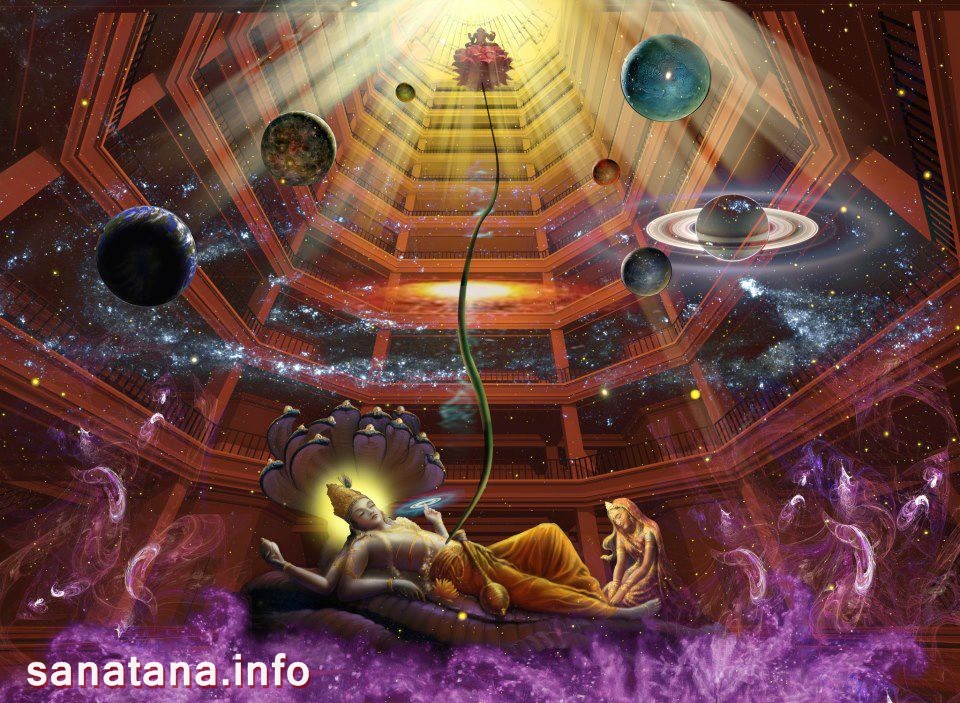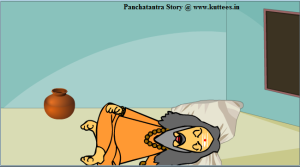The Creator and His Children
All beings are the children of Prajaapathi, the Creator. These living beings can be categorized into three groups – the Devas, the Manushyaas, and the Asuras.
- Devas:
- The first group, the Devas, are the Celestials who are the denizens of Paradise, where they enjoy all sorts of pleasures.
- Manushyaas:
- The second group, the Manushyaas, are the Human Beings who live on this Earth.
- Asuras:
- The third group, the Asuras, are the demons who are extremely cruel.
All three groups of beings studied at the feet of Prajaapathi.
The Final Teaching
After their studies under him, all three groups of children approached Prajaapathi, one group at a time, and asked him for a final teaching.
The Teaching to the Devas
When the Devas approached Him and said, “Please teach us, Father,” He said to them the single syllable “Da.” Then He asked, “Did you understand?” They said, “Yes. We have understood what you said. It is ‘Daamyata – Control Yourselves.’” He said, “Yes. You have understood it.”
The Teaching to the Manushyaas
When the Manushyaas approached Him and said, “Please teach us, Father,” He said to them the single syllable “Da.” Then He asked, “Did you understand?” They said, “Yes. We have understood what you said. It is ‘Datta – Be Charitable.’” He said, “Yes. You have understood it.”
The Teaching to the Asuras
When the Asuras approached Him and said, “Please teach us, Father,” He said to them the single syllable “Da.” Then He asked, “Did you understand?” They said, “Yes. We have understood what you said. It is ‘Dayathvam – Be Merciful.’” He said, “Yes. You have understood it.”
The Thunderous Reminder
Then there was loud thunder with the sound “Da Da Da,” which reflected in the minds of the Devas, Manushyaas, and Asuras as “Daamyata, Datta, Dayathvam” respectively.
The Message in the Thunder
Will we remember this Sermon whenever the thunder goes “Da Da Da”?
This story occurs in the Brihad Aaranyaka Upanishad and serves as a profound reminder of these three essential virtues.
Reflection on the Story
Universal Values:
- The story highlights that despite their differences, all beings—Devas, Manushyaas, and Asuras—are taught fundamental values that are crucial for harmony and spiritual growth.
Self-Control:
- For the pleasure-seeking Devas, “Daamyata” or self-control is essential to maintain balance and avoid indulgence.
Charity:
- For the humans, “Datta” or charity is vital, encouraging them to share their resources and foster a sense of community and compassion.
Mercy:
- For the cruel Asuras, “Dayathvam” or mercy is crucial, urging them to temper their harshness and cultivate kindness.
Lessons to Be Learned
- Embrace Self-Control:
- Practicing self-control helps in maintaining discipline and balance in life, preventing overindulgence and fostering inner peace.
- Practice Charity:
- Being charitable and sharing with others promotes compassion, empathy, and a sense of community, enriching both the giver and the receiver.
- Cultivate Mercy:
- Showing mercy and kindness, even to those who may not deserve it, transforms hearts and creates a more compassionate and just world.
- Remembering Divine Teachings:
- The thunderous “Da Da Da” serves as a natural reminder of these teachings, urging us to integrate them into our daily lives.
Conclusion
In summary, the story from the Brihad Aaranyaka Upanishad teaches us about the importance of self-control, charity, and mercy. These universal values are essential for maintaining harmony and fostering spiritual growth among all beings. By remembering the divine syllable “Da” and its profound meanings, we can strive to live a life aligned with these virtues.
4o



